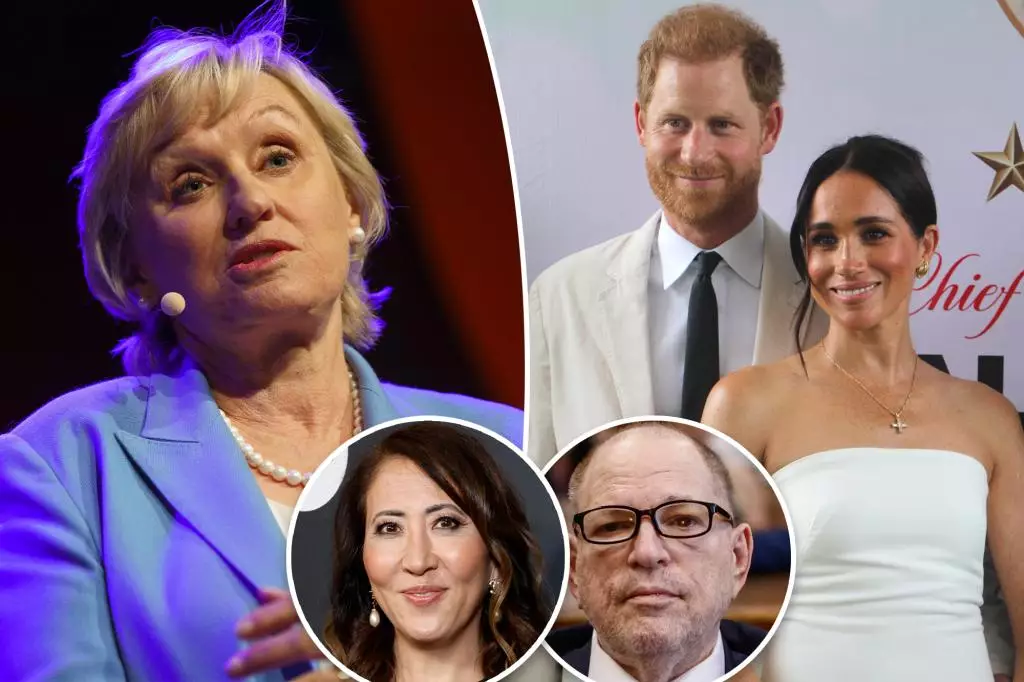Tina Brown, a prominent figure in the media landscape and former editor of noteworthy publications, recently aired her candid opinions about Meghan Markle and Prince Harry. Her insights stem not only from a lifetime spent in journalism but also from her own professional missteps, adding depth to her critiques. This article unpacks Brown’s remarks regarding the Duke and Duchess of Sussex while also exploring her retrospective reflections on past career choices, providing a nuanced understanding of celebrity culture and media dynamics.
In a recent podcast appearance, Tina Brown did not hold back when discussing Meghan Markle, stating bluntly that Markle’s ideas are “total crap.” Such strong language adds weight to her assertion that Markle’s judgment is fundamentally flawed. Brown asserts that despite Markle’s refined background and previous acting success, she has consistently made disastrous decisions in her post-royal life. This critical stance raises questions about the disconnect between public perception and the reality behind celebrity decision-making processes.
Brown’s observation that Markle has a “perfectionist” approach to making mistakes magnifies a common dilemma in the world of fame: the paradox of ambition coupled with ignorance. It appears Markle’s insistence on forging her own path blinds her to the wisdom offered by others—a point Brown underscores by stating Markle solicits opinions but disregards them in favor of her preconceived notions. This phenomenon of ‘celebrity isolation,’ where the individual becomes enveloped in their self-generated narrative, cuts across many public figures’ lives.
Brown’s insights extend to Prince Harry, whom she characterized as a “naïve” individual who has become a “lamb to the slaughter” under Markle’s influence. This description portrays Harry not merely as a decision-maker but as a victim of his own romantic choices. Brown argues that Harry’s royal upbringing didn’t equip him with the worldly knowledge necessary to navigate the complexities of modern celebrity, particularly the harsh judgments that tend to accompany high-profile exits from institutional life.
The juxtaposition of Harry’s perceived talents as a royal against his ineptitude in self-management creates a tragic narrative. He excels in the role he was born into but falters in venturing beyond it, emphasizing the difficulty individuals face when redefining their identities outside of established frameworks. Brown’s analysis intertwines empathy with critique, invoking a layered understanding of the pressures faced by royals and celebrities alike.
Brown’s foreboding prediction regarding Markle’s future raises another point of interest—what lies ahead for public figures who have experienced a rapid fall from grace? According to Brown, Markle has exhausted her options and made “every mistake in the book.” This prescient observation speaks to broader issues within celebrity culture, wherein individuals may diminish their public standing through misjudgments or poorly executed branding efforts.
As Markle grapples with her diminishing relevance, the prospect of recovery remains uncertain. This uncertainty underscores a recurring theme within high-profile public lives: the tenuous grip on fame and the fleeting nature of public favor. Comparatively, Brown believes Harry, despite his circumstances, retains opportunities for redemption, suggesting that the royal lineage maintains a degree of protection against the fickleness of public opinion.
In juxtaposition to her critiques of the Sussexes, Brown recalled her own professional misadventure in partnering with Harvey Weinstein. By openly acknowledging this misstep as “the dumbest career move of anybody’s life,” she engages in a critical self-analysis that is often overlooked in high-profile figures. This admission not only lends authenticity to her commentary but also highlights the intertwined nature of personal and professional decisions within the media landscape.
Brown’s interaction with Weinstein also provides a fascinating lens on power dynamics in media and how they can shape a career trajectory. As she navigated her own challenging experiences, she reflects upon the broader implications of misjudgment in the professional realm—an ongoing challenge that permeates all industries.
Tina Brown’s perspectives on Meghan Markle and Prince Harry encapsulate the multifaceted nature of modern fame and celebrity. Her insights serve as a reminder of the precarious balance individuals must maintain while navigating public perception and personal aspirations. Within the intertwined domains of celebrity, media, and professional integrity, Brown’s reflections encourage a deeper understanding of the challenges faced by those in the spotlight—be they royals, actors, or journalists. Ultimately, her critiques invite us to consider the weight of decisions made in an unforgiving public arena and the enduring impact they have on identity and legacy.


Leave a Reply